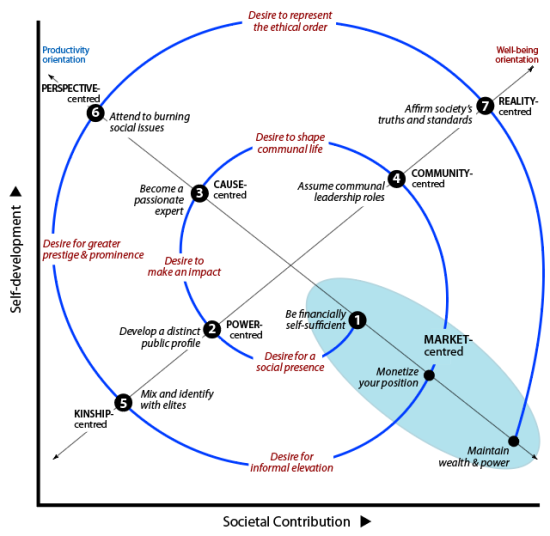Joining the Elites in Society
Desire replaces Need
Every society has its elites as a consequence of the natural tendency to social stratification. However, becoming an elite is not a need. It seems more appropriate to consider it as a desire.
While there will be gradations in the intensity of this aspiration, let us assume maximum intensity. From that perspective, the desire to become one of society's elites generates slightly different requirements in the developmental trajectory.
Social status will be far more actively sought because it becomes a manifestation of social power and is viewed as a source of wealth. Financial means and economic security becomes a tool in striving for status. Ultimately, philosophers and saints apart, it seems that nothing less than great wealth is satisfying.
Intrinsic to this aspiration is a greater degree of passion and public prominence. We see a seemingly irresistible urge to separate from the masses and lead them or at least affect their fate. As a result, the two Cycles have slightly different goals:
Cycle-1 is not just a matter of reputation but about developing a public presence that can receive, possess and dole out influence.
Cycle-2 is not just about future-proofing but about becoming embedded in an undefined informal leadership of society
Transitions are driven by desire.
Cycle-1: Public Presence

Stage-1 () commences with being financially self-sufficient: but elites are often born with advantages, most commonly being part of the wealthy upper class. While the typical aspirant may start off financially self-sufficient, a desire to earn well remains.
The first transition is driven by the desire for a social presence and uses familial as well as personal strengths and resources.
Stage-2 () is associated with obtaining a distinct public profile which provides for a celebrity-type power.
Transition to the next Stage is driven by the desire to make an impact.
Stage-3 () involves developing evident passion for a popular cause, and becoming expert on the subject without this necessarily being linked to work or business.
Transition to the next Stage is driven by the desire to shape communal life.
Stage-4 () involves taking on formal communal leadership roles: for example in commerce, the arts, education, welfare, or the environment. Large donations are often made with well-judged publicity. The result of this will be to gain entrance to a network that engages with politicians and top officials and also includes capable people, some of whom will be rich and powerful.
This enables a move back to with an ability to use reputation and networks to increase wealth e.g. via investment opportunities or governmental connections.
However, celebrity and wealth are not enough: concern now shifts to a desire for informal elevation in social rank well beyond the masses.
Cycle-2: Wealth & Power
Stage-5 () becomes about mixing with existing elites in both intimate and public settings. The goal here is to join in activities and gain privileges that reveal an identification with elite values, status and wealth.
Transition to the next Stage is driven by the desire for greater prestige and prominence.
Stage-6 () involves broadening horizons of concern into burning social issues with no necessary connexion to work or previous experience. International charitable activities are popular because to tackle similar issues domestically could embarrass fellow elites.
Transition to the next Stage is driven by the desire to represent the ethical order of society.
Stage-7 () is about affirming the conventional truths and standards of society. Elites often know that certain societal conventions and practices are corrupt or harmful, but it is unthinkable to ever break ranks at this point. Sometimes, after retiring from public life and losing all influence, an elite will tell the truth in a book that, after an initial flurry of interest, is quickly buried and forgotten.
The final automatic move is to the lower right end of the , which reveals that everything is now in place to maintain wealth and power.
- Continue to the Elite Status Tree
- Back to the review.
- Forward to determinants of social standing.
Originally posted: 1-July-2025